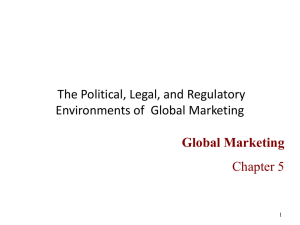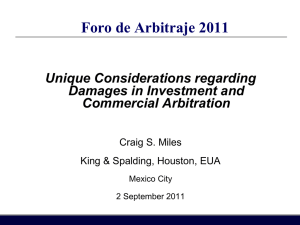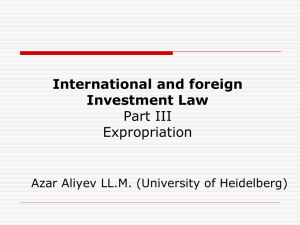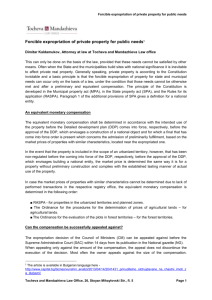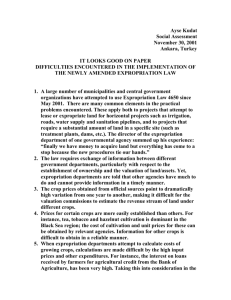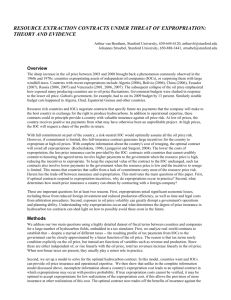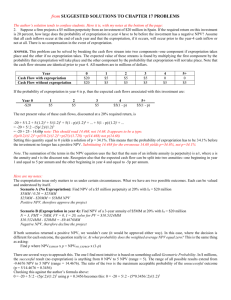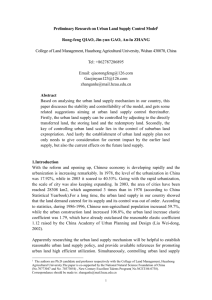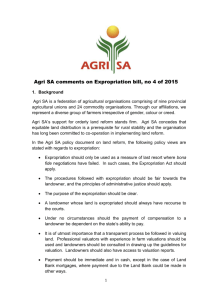Table
advertisement
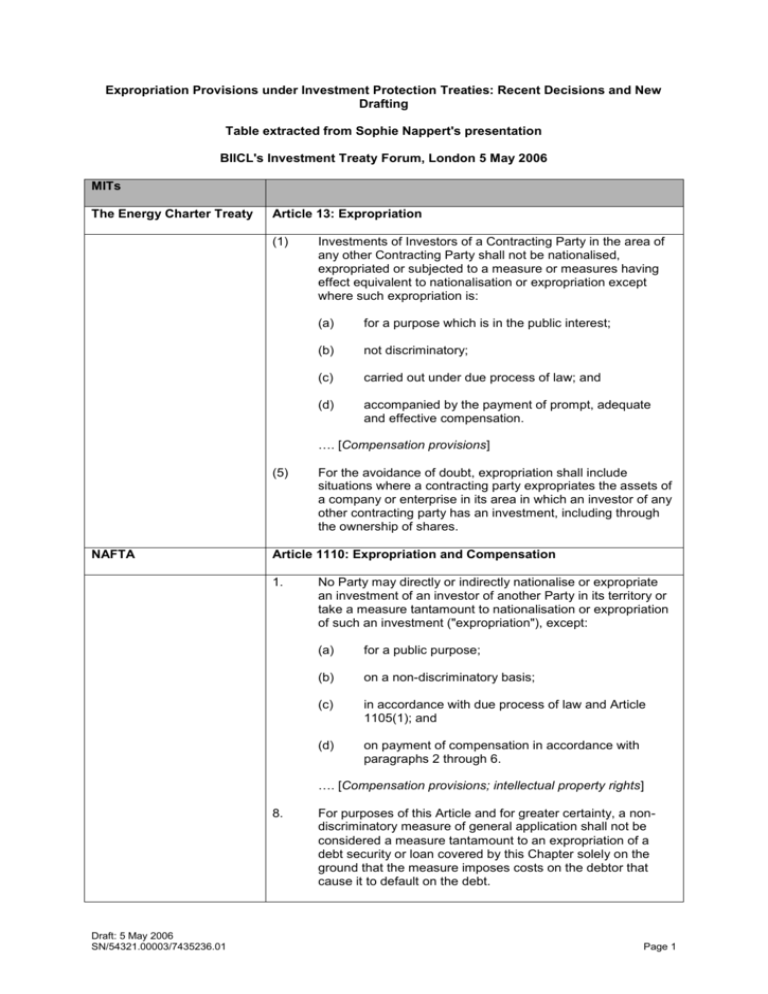
Expropriation Provisions under Investment Protection Treaties: Recent Decisions and New Drafting Table extracted from Sophie Nappert's presentation BIICL's Investment Treaty Forum, London 5 May 2006 MITs The Energy Charter Treaty Article 13: Expropriation (1) Investments of Investors of a Contracting Party in the area of any other Contracting Party shall not be nationalised, expropriated or subjected to a measure or measures having effect equivalent to nationalisation or expropriation except where such expropriation is: (a) for a purpose which is in the public interest; (b) not discriminatory; (c) carried out under due process of law; and (d) accompanied by the payment of prompt, adequate and effective compensation. …. [Compensation provisions] (5) NAFTA For the avoidance of doubt, expropriation shall include situations where a contracting party expropriates the assets of a company or enterprise in its area in which an investor of any other contracting party has an investment, including through the ownership of shares. Article 1110: Expropriation and Compensation 1. No Party may directly or indirectly nationalise or expropriate an investment of an investor of another Party in its territory or take a measure tantamount to nationalisation or expropriation of such an investment ("expropriation"), except: (a) for a public purpose; (b) on a non-discriminatory basis; (c) in accordance with due process of law and Article 1105(1); and (d) on payment of compensation in accordance with paragraphs 2 through 6. …. [Compensation provisions; intellectual property rights] 8. Draft: 5 May 2006 SN/54321.00003/7435236.01 For purposes of this Article and for greater certainty, a nondiscriminatory measure of general application shall not be considered a measure tantamount to an expropriation of a debt security or loan covered by this Chapter solely on the ground that the measure imposes costs on the debtor that cause it to default on the debt. Page 1 CAFTA Article 10.7: Expropriation and Compensation 1. No Party may expropriate or nationalise a covered investment either directly or indirectly through measures equivalent to expropriation or nationalisation ("Expropriation"), except: (a) for a public purpose; (b) in a non-discriminatory manner; (c) on payment of prompt, adequate, and effective compensation in accordance with paragraphs 2 through 4; and (d) in accordance with due process of law and Article 10.5. …. [compensation provisions; intellectual property rights] Annex 10-C: Expropriation The Parties confirm their shared understanding that: 1. Article 10.7.1 is intended to reflect customary international law concerning the obligation of States with respect to expropriation. 2. An action or a series of actions by a Party cannot constitute an expropriation unless it interferes with a tangible or intangible property right or property interest in an investment. 3. Article 10.7.1 addresses two situations. The first is direct expropriation, where an investment is nationalized or otherwise directly expropriated through formal transfer of title or outright seizure. 4 The second situation addressed by Article 10.7.1 is indirect expropriation, where an action or series of actions by a Party has an effect equivalent to direct expropriation without formal transfer of title or outright seizure. (a) Draft: 5 May 2006 SN/54321.00003/7435236.01 The determination of whether an action or series of actions by a Party, in a specific fact situation, constitutes an indirect expropriation, requires a caseby-case, fact-based inquiry that considers, among other factors: (i) the economic impact of the government action, although the fact that an action or series of actions by a Party has an adverse effect on the economic value of an investment, standing alone, does not establish that an indirect expropriation has occurred; (ii) the extent to which the government action interferes with distinct, reasonable investmentbacked expectations; and (iii) the character of government action. Page 2 (b) Except in rare circumstances, nondiscriminatory regulatory actions by a Party that are designed and applied to protect legitimate public welfare objectives, such as public health, safety, and the environment, do not constitute indirect expropriations. BITs BIT: Germany and Pakistan (1959) BIT: the USA and Ukraine (1996) BIT: Chile and the UK (1996) Article 3 1. [Full protection and security] 2. Nationals or companies of either Party shall not be subjected to expropriation of their investments in the territory of the other Party except for public benefit against compensation, which shall represent the equivalent of the investments affected. Such compensation shall be actually realisable and freely transferable in the currency of the other Party without undue delay. Adequate provision shall be made at or prior to the time of expropriation for the determination and the grant of such compensation. The legality of any such expropriation and the amount of compensation shall be subject to review by due process of law. 3. [Most favoured nation treatment] Article III 1. Investments shall not be expropriated or nationalised either directly or indirectly through measures tantamount to expropriation or nationalisation ("Expropriation") except: for a public purpose; in a non-discriminatory manner; upon payment of prompt, adequate and effective compensation; and in accordance with due process of law and the general principles of treatment provided for in Article II (2). …[Compensation provisions] 2. A national or company of either Party that asserts that all or part of its investment has been expropriated shall have a right to prompt review by the appropriate judicial or administrative authorities of the other Party to determine whether any such expropriation has occurred and, if so whether any such expropriation, and any associated compensation, conforms to the principles of international law. 3. [Most favoured nation treatment] Article 4: Expropriation 1. Draft: 5 May 2006 SN/54321.00003/7435236.01 Investments of investors of either Contracting Party shall not be nationalised, expropriated or subjected to measures having effect equivalent to nationalisation or expropriation (hereinafter referred to as "Expropriation") in the territory of the other Contracting Party unless the measures are taken for a public benefit related to the internal needs of that Party in a nondiscriminatory manner, by authorisation of a formal law, and against prompt, adequate and effective compensation. Page 3 …[Compensation provisions] 2. 2004 US Model Bilateral Investment Treaty Where a Contracting Party expropriates the assets of an investor which is incorporated or constituted under the law enforced in any part of its own territory, and in which investors of the other Contracting Party own shares, it shall ensure that the provisions of paragraph (1) of this Article are applied to the extent necessary to guarantee prompt, adequate and effective compensation in respect of their investment to such investors of the other Contracting Party who are owners of those shares. Article 6: Expropriation and Compensation 1. 5. Neither Party may expropriate or nationalise a covered investment either directly or indirectly through measures equivalent to expropriation or nationalisation ("expropriation"), except: (a) for a public purpose; (b) in a non-discriminatory manner; (c) on payment of prompt, adequate, and effective compensation; and (d) in accordance with due process of law and Article 5 [minimum standard of treatment] (1) through (3). [Compensation provisions and intellectual property rights] Annex B: Expropriation The Parties confirm their shared understanding that: 1. Article 6 [Expropriation and Compensation](1) is intended to reflect customary international law concerning the obligation of States with respect to expropriation. 2. An action or a series of actions by a Party cannot constitute an expropriation unless it interferes with a tangible or intangible property right or property interest in an investment. 3. Article 6 [Expropriation and Compensation] (1) addresses two situations. The first is direct expropriation, where an investment is nationalized or otherwise directly expropriated through formal transfer of title or outright seizure. 4. The second situation addressed by Article 6 [Expropriation and Compensation] (1) is indirect expropriation, where an action or series of actions by a Party has an effect equivalent to direct expropriation without formal transfer of title or outright seizure. (a) Draft: 5 May 2006 SN/54321.00003/7435236.01 The determination of whether an action or series of actions by a Party, in a specific fact situation, constitutes an indirect expropriation, requires a case- Page 4 by-case, fact-based inquiry that considers, among other factors: (b) Canada's model FIPA (2004) (i) the economic impact of the government action, although the fact that an action or series of actions by a Party has an adverse effect on the economic value of an investment, standing alone, does not establish that an indirect expropriation has occurred; (ii) the extent to which the government action interferes with distinct, reasonable investmentbacked expectations; and (iii) the character of government action. Except in rare circumstances, non-discriminatory regulatory actions by a Party that are designed and applied to protect legitimate public welfare objectives, such as public health, safety, and the environment, do not constitute indirect expropriations. Article 13: Expropriation Neither Party shall nationalise or expropriate a covered investment either directly, or indirectly through measures having an affect equivalent to nationalisation or expropriation (hereinafter referred to as ' expropriation‘), except for a public purpose, in accordance with due process of law, in a non-discriminatory manner and on prompt, adequate and effective compensation. The investor affected shall have a right, under the law of the Party making the expropriation, to prompt review, by a judicial or other independent authority of that Party, of its case and of the valuation of its investment in accordance with the principles set out in this Article. Annex B.13(1): Expropriation The Parties confirm their shared understanding that: Draft: 5 May 2006 SN/54321.00003/7435236.01 (a) Indirect expropriation results from a measure or series of measures of a Party that have an effect equivalent to direct expropriation without formal transfer of title or outright seizure; (b) The determination of whether a measure or series of measures of a Party constitute an indirect expropriation requires a case-by-case, fact-based inquiry that considers, among other factors: (i) the economic impact of the measure or series of measures, although the sole fact that a measure or series of measures of a Party has an adverse affect on the economic value of an investment does not establish that an indirect expropriation has occurred; (ii) the extent to which the measure or series of measures interfere with distinct, reasonable investment-backed Page 5 expectations; and (iii) (c) Closer Economic Partnership Agreement between Thailand and New Zealand (2005) (a) the expropriation is for a public purpose related to the internal needs of that Party; (b) the expropriation is under due process of law; (c) the expropriation is non-discriminatory; and (d) the expropriation is accompanied by the payment of prompt, adequate and effective compensation. Investments by Investors of either Contracting Party shall not directly or indirectly be expropriated, nationalised, or subjected to any other measure, the effects of which would be tantamount to expropriation or nationalisation in the territory of the other Contracting Party (hereinafter referred to as expropriation) except for the public benefit and against compensation. … At the request of the Investor the legality of any such expropriation and the amount of compensation shall be subject to review by national courts, notwithstanding the provisions of Article 9. Article 6.5: Expropriation 1. Draft: 5 May 2006 SN/54321.00003/7435236.01 Neither Party shall nationalise, expropriate or subject to measures equivalent to nationalisation or expropriation (hereinafter referred to as "expropriation") the covered investments of investors of the other Party unless the following conditions are complied with: Article 4: Expropriation and Compensation 2. Comprehensive economic co-operation agreement between India and Singapore (2005) Except in rare circumstances, such as when a measure or series of measures are so severe in the light of their purpose that they cannot be reasonably viewed as having been adopted and applied in good faith, non-discriminatory measures of a Party that are designed and applied to protect legitimate public welfare objectives, such as health, safety and the environment, do not constitute indirect expropriation. Article 9.11: Expropriation 1. Agreement between China and Germany on the encouragement and reciprocal protection of investments the character of the measure or series of measures; Neither Party shall take any measure of expropriation against the investments of investors of the other Party unless the measures are taken on a non-discriminatory basis, for a purpose authorised by law, in accordance with due process of law and against payment of compensation in accordance with Page 6 this Article. Draft: 5 May 2006 SN/54321.00003/7435236.01 3. The investor whose investment is expropriated shall have a right of access to the Courts of Justice or the administrative tribunals or agencies of the Party making the expropriation to seek a view of the expropriation measure or valuation of the compensation that has been assessed in accordance with the principles and provisions set out in this Article. 4. When a Party expropriates the assets of an enterprise which is incorporated or constituted under the laws in force in any part of its own territory, and in which investors of the other Party own shares, it shall ensure that the provisions of paragraph 1 and 2 are applied to the extent necessary to guarantee compensation as specified therein to such investors of the other Party who are owners of those shares. 5. This Article does not apply to the issuance of compulsory licences granted in relation to intellectual property rights, or to the revocation, limitation or creation of intellectual property rights to the extent that such issuance, revocation, limitation, operation is consistent with the WTO Agreement on Trade Related Aspects of Intellectual Property Rights. Page 7

